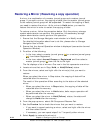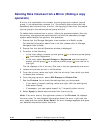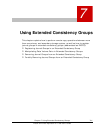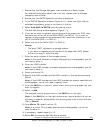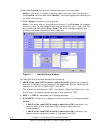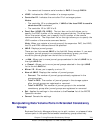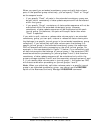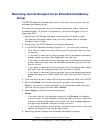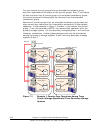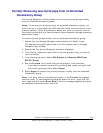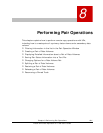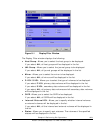
7-6 Chapter 7 Using Extended Consistency Groups
Hitachi Universal Replicator for IBM /OS User’s Guide
When you specify an extended consistency group and split data volume
pairs in the specified group collectively, you can specify "Flush" or "Purge"
as the suspend mode:
– If you specify "Flush", all pairs in the extended consistency group can
be split while consistency of data update sequence will be maintained
within that group.
– If you specify "Purge", consistency of data update sequence will not be
maintained within the extended consistency group. However,
consistency of data update sequence will be maintained within each
journal group. Furthermore, the pairs will be split faster than when
"Flush" is specified.
If you wish to split, restore or release data volume pairs in an extended
consistency group, you can split, restore or release all data volume pairs
that belongs to a specific journal group in the extended consistency group
collectively. If you collectively split data volume pairs that belong to a
specific journal group in the extended consistency group, the supervisor
DKC will execute arbitration processing on the other journal groups. For
example, in the case described in
Figure 7-2 below, if you collectively split
all data volume pairs that belongs to journal group 1, the supervisor DKC
executes arbitration processing on journal groups 2 and 3, and therefore
consistency of data update sequence will be maintained only within the
primary storage systems 2 and 3 and the secondary storage systems 2 and
3. If you restore data volume pairs in journal group 1, the supervisor DKC
will execute arbitration processing on journal groups 1 and 3.
Note: When you collectively split data volumes pairs in a specific journal
group in an extended consistency group, you cannot use the REVERSE
option of the Business Continuity Manager YKSUSPND command.



